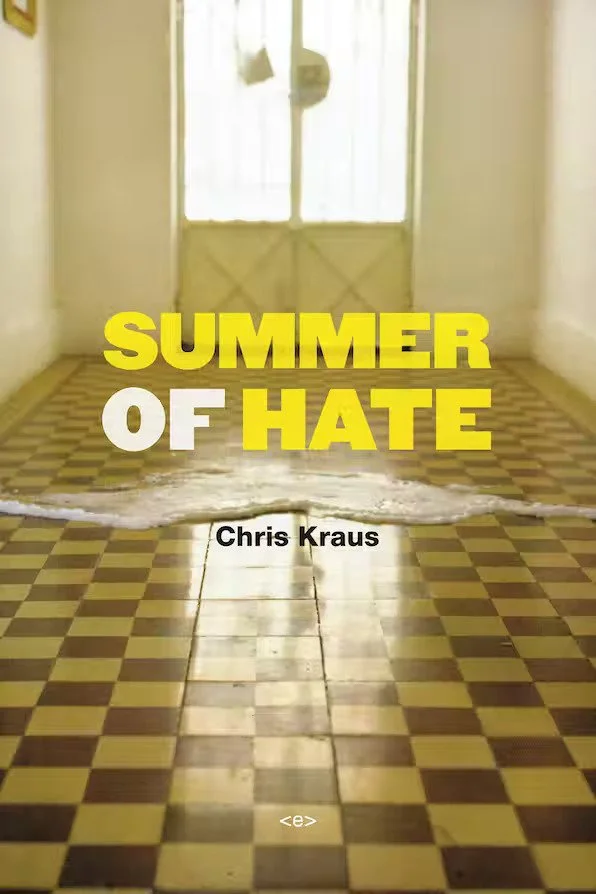SUMMER OF HATE
By Chris Kraus
“In his journal, Paul liked to make lists: What he ordered from Commissary (shaving cream, toothpaste, deodorant, the transistor radio he had for a week before the guards took it away). The books he picked off the cart (The Bible, Dean Koontz, Stephen King, Codependent No More.) What phone calls he made and received; also, Bible Study certificates, letters and cards, his workout routines and his moods (Anxious, Nervous, Trusting in God, but mostly Depressed). Paul has a record of every push-up he did while he was in prison but he cannot remember shit about what happened before his arrest.”
—from Summer of Hate
Waking up from the chilling high of a near-death sex game, Catt Dunlop travels to Albuquerque in 2005 to reinvest some windfall real-estate gains and reengage with something approximating “real life.” Aware that the critical discourse she has used to build her career as a visiting professor and art critic is really a cipher for something else, she hopes that buying and fixing slum buildings will bring her more closely in touch with American life than the essays she writes.
In Albuquerque, she becomes romantically involved with Paul Garcia, a recently sober ex-con who has just served sixteen months in state prison for defrauding Halliburton Industries, his former employer, of $873. Almost forty years old, Paul is highly intelligent but has only been out of New Mexico twice. He has no information. With Catt's help, he makes plans to attend UCLA, only to be arrested on a ten-year-old bench warrant en route.
Caught in the nightmarish Byzantine world of the legal system, Catt and Paul’s empathic attempts to save each other's lives seems doomed to dissolve. Summer of Hate is a novel about flawed reciprocity and American justice, recording recent events through the prism of a beleaguered romance. As lucid and trenchant as ever, Kraus in her newest novel reminds us that the writer can be a first responder of sorts when power becomes invisible, or merely banal.
“From Critical Theory California, Chris Kraus now moves closer to the diseased heart of the USA: dried-out, drugged-out, paranoid New Mexico. Reading this book is like watching a car crash happen in slow motion. Very few writers are as intelligent and honest as Kraus—and no one sees so clearly.”
—Keith Gessen
“Chris Kraus cuts a new and insatiably clever line in this explosive new work, breaking down big themes like art writing, romance, and capitalism, within a wildly expansive take on the thriller.”
—Janine Armin, Joyland
“Summer of Hate is as disturbing, powerful and original as anything I've read in recent years, creating an existential noir out of the American landscape, the Southwest, the industrial prison system. A writer, in hiding from her would-be killer, cobbles together a community of misfits. A recovering addict is out of jail and seeking redemption, though everywhere he turns he finds traps. Avert your eyes if you don't like the truth. Freedom—both personal and political–is revealed as painfully illusive in this gripping novel.”
—Danzy Senna
“Chris Kraus is one of our smartest and most original writers on art and culture.”
—Holland Cotte, New York Times
“For readers tired of political art's worn-out strategies, Summer of Hate joins the rest of Kraus' bibliography in offering an engaging and razor-sharp alternative.”
—Meagan Day, Full-stop
“Summer of Hate is original, intelligent, darkly humorous, emotionally honest, and it grips the reader with a relentless thriller-like force.”
—Victoria Patterson, Los Angeles Review of Books
“When writers like Kraus commit to a subjective stance—biographical or not—they become easy targets for critics quick to dismiss the work as indulgent, aggressive, or victimizing. Summer of Hate is commendable for not only taking up the mantle of sexualized female subjectivity, but for its narrative of exploration the real psychic underbelly of the elite art world: the experience of the disenfranchised and the incarcerated, and the limits of a social system that imposes ever greater disparities between classes.”
—Brooklyn Rail
Paperback, 256 pp.
Published August 3, 2012
